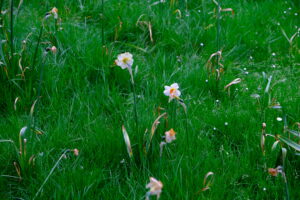Lost in West Port Garden times – Invite to workshop

Phenology attends to the timings of seasonal life cycle events of plants and animals. For scientific purposes, the phenophases (leaf emergence, flower blossoming, bare tree, hibernation, egg-laying, nesting, any many others) are clearly marked and defined so as to gain a deeper understanding of when these activities are performed by our other-than-human cohabitants over time every year.
If the 19th century phenologists Henry David Thoreau and Leopold looked to capture “environmental rhythms” (Dimick, 2017) then today phenology is studied to discern environmental changes. In either case, tracking the “when” of ecological activities provides spaces of comparison. If you have not taken notice of “how things hold” now or yesterday, perhaps with a conscious mental or physical note, it is not possible to sense how things are shifting, moving, changing. In fact, everything might just seem completely ordinary. Attending to the present and the temporalities it enfolds can kindle curiosity and reinvigorate understandings of “temporal diversity” (Rose, 2012) and complexity that perhaps gets less airtime when it comes to understanding ecological processes (Salleh, 1997, Rose, 2012). Observing and telling the time is an important ethical and political means of connecting with current events and experiences (Bastian, 2012).
Paying attention to temporal unfoldings is not a simple task and, to state the obvious, it takes time. That’s why we need each other, to help point to that which intrigues us and which we can recognise through our own knowledge, interests, experiences. Which is what this workshop will be exploring!
The workshop will be 1.5h long, creative, and exploratory. Over the 25-minute field visit to the West Port Gardens you’ll have a chance to explore the space through your chosen phenological lens/medium and other-than-human timings. Towards the end we will, collaboratively, assemble a phenology recording protocol collection for the space and teach each other a method.
So please come and explore the different ways we can seek, uncover, describe and become attentive to other-than-human activities and times! Valuing other temporalities begins with taking interest, noticing, holding the temporal activities of others in our field of awareness.
Details:
Date: 4th of June, Tuesday morning, 10am-12pm
Venue: Evolution House, 5th Floor Board Room (subject to change!) with a visit to the West Port Garden nearby (so please dress for the weather)
Hosted by Keili Koppel
This event is part of the Anthropocene (A)synchronicities project at Lancaster University, funded by the British Academy.
Generous amount of Considerit vegan donuts and coffee to be expected!
SIGN UP HERE WITH NAME AND EMAIL (https://forms.gle/y4cBriyrANZeC1TJA)
References:
- Bastian, M., 2012. Fatally confused: Telling the time in the midst of ecological crises. Environmental Philosophy, 9(1), pp.23-48.
- Dimick, S., 2018. Disordered environmental time: phenology, climate change, and seasonal form in the work of Henry David Thoreau and Aldo Leopold. ISLE: Interdisciplinary Studies in Literature and Environment, 25(4), pp.700-721.
- Rose, D.B., 2012. Multispecies knots of ethical time. Environmental Philosophy, 9(1), pp.127-140.
- Salleh, A. 1997. Ecofeminism As Politics: Nature, Marx and the Postmodern. Zed Books.



